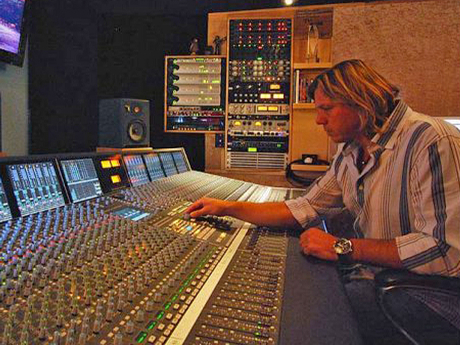
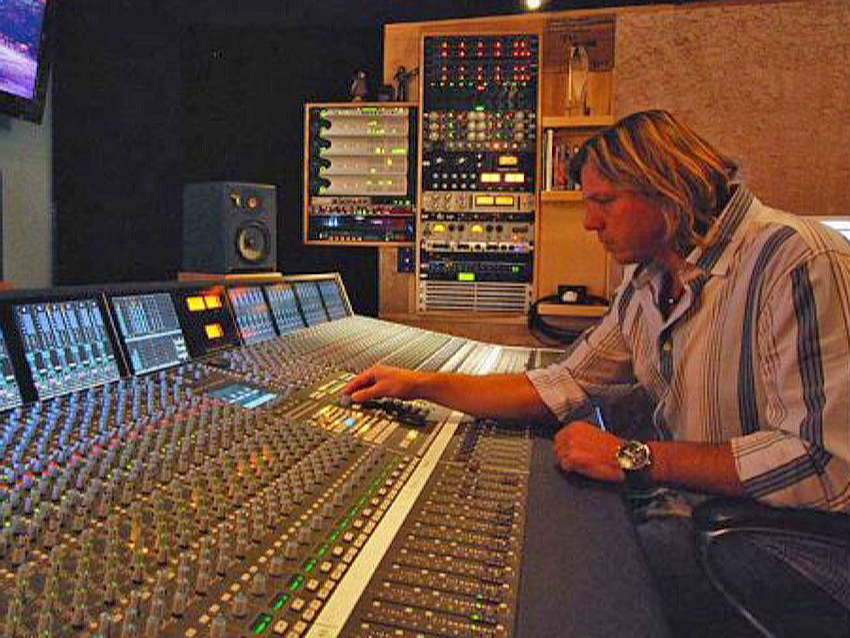
Kevin Shirley tweaks sounds at the board in his California studio.
Sitting at one of the consoles in his Caveman Studios in Los Angeles, Kevin Shirley is taking a break from producing Joe Bonamassa's upcoming solo album. "It's fuckin' bad-ass," he says with a laugh. "We try and do a record annually, Joe and I, and every time I'm amazed at his growth. But now it's like he's a whole different animal. He's really evolved in every way possible. So I'm just trying to capture that as quickly and accurately as I can."
Shirley's come a long way from his early days in his native South Africa, and he admits that his first studio gig was far from glamorous. "I wanted to be a producer very badly, so I sat in the lobby of this guy's studio, and I wouldn't leave till he gave me a job. Which he did - he said I could paint the place! But that was my way in. You've got to get in somehow."
Shirley paid his dues, recording jingles and whatever else was booked. "I got fired a bunch of times from the same studio, but I kept coming back," he says. "I learned the ropes. I borrowed studio time, learned how to make records and work with bands. I did what I had to do. After a while, I had a couple of number of records in South Africa and worked with a lot of big artists."
A move to Australia led to Shirley engineering the debut album for the band Baby Animals, but his real big break came from producing Silverchair's Frogstomp in 1995, during the height of grunge and alt-rock. "That was the one that really established me," he says. "They were a homegrown act, and they happened big-time. Frogstomp got my name around like nothing had before."
And now he's sitting atop the rock world, having produced hits for dozens of acts. From Bonamassa to Journey to Iron Maiden to Dream Theater to Jimmy Page & The Black Crowes (he also mixed the Led Zeppelin live package How The West Was Won), and more recently, the upcoming album by the reunited Mr Big - all carry the Kevin Shirley name. Asked to explain how he's become one of music's handful of go-to guys, he puts it simply: "Patience, understanding and a ton of honesty. Special emphasis on honesty."
You and Joe Bonamassa have established quite a successful working relationship over the years. What's been the secret?
Want all the hottest music and gear news, reviews, deals, features and more, direct to your inbox? Sign up here.
"On never being satisfied. We keep the material fresh, and we keep pushing the musical boundaries. At the same time, it's important to realize what Joe is, what he wants to be, what his audience wants, and to make things exciting in that context. Plus, there's been a whole business model we've embraced that has worked out very well, one that's based on touring and keeping him out there. We've worked pretty hard on this whole endeavor. In this environment, you have to have your eyes on so many pieces of the puzzle."
When you say "environment," are you referring to downloading and its effect on the music industry?
"Sure. Downloading has definitely impacted the business, and to be quite honest, I've found many of the attitudes to the matter to be quite banal. I mean, you don't just steal people's work - that's crazy. There's no question that downloading has affected music. And now, the bigger issue has unfortunately become, what is music actually worth? Well, if you're looking at it in an old-school model way, not much. It doesn't work anymore. You can't make a decent record with a good budget and expect to make back your investment from record sales alone - those days are long gone.
"So the big picture, and one of the things that Joe Bonamassa has done, is seeing where all the parts of the business truly fit together. Joe realizes that making a good record is important, and he'll invest in that, but where he truly sees the returns from that is in the live situation.
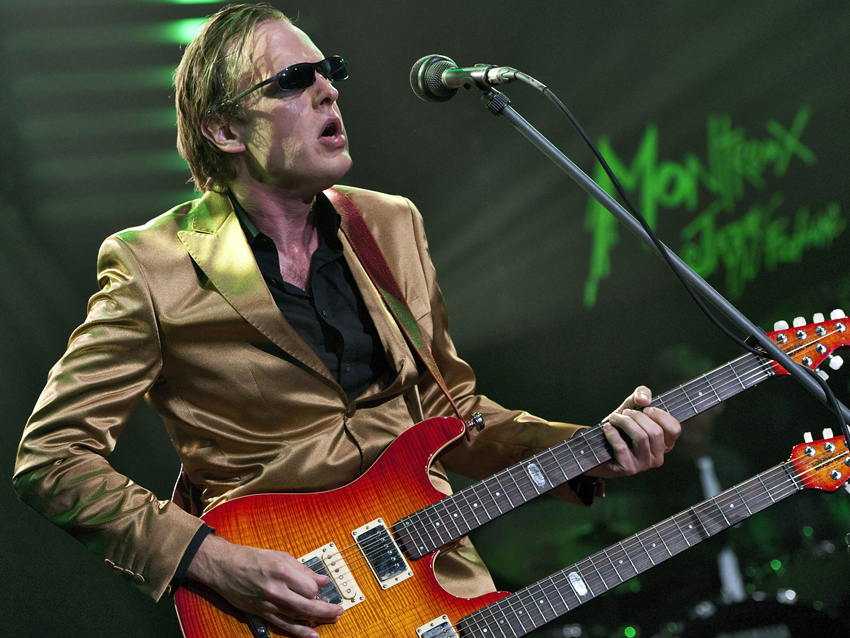
Shirley and Joe Bonamassa (above) are working on a "bad-ass" new album. © JEAN-CHRISTOPHE BOTT/epa/Corbis
"Now, what the labels are trying to do is get a piece of that with the 360 deals, where they participate in the touring and merchandizing and all the other elements of a band's revenue stream. That's the new model, and it's still extremely hard to figure out with everybody. Listen, I've worked with Journey and Iron Maiden and Led Zeppelin and big acts like that. You know, if I went to them and said, 'Oh, by the way, I'd like a piece of your two million tickets you're going to sell next year, they'd tell me to fuck off. We're experiencing birthing pains still in the shift of the business. The fact remains, though, that downloads are here to stay. I realize that, as does Joe, which is why I think he's been very successful at navigating the new model of the record business."
Earlier you said how amazed you are at Joe's growth. When you first saw him, what were your thoughts? What did you think was there that you could help to bring out?
"This is going to sound arrogant, and I certainly don't mean to come off that way. I went to go see Joe play at a club in Chicago, and I thought he was a good musician but a little limited stylistically. So after the show, I had a chat with him. I told him, 'Joe, you're a wonderful player, but unless you're willing to trust me and go outside the box, there isn't much I can do for you.' About a week later, he called me and said, 'All right, I trust you. Let's do it.'"
And "going outside the box" meant what? How did you push him?
"He was playing pretty traditional blues stuff, and there's a lot of guys doing that. Walter Trout, Derek Trucks, Jonny Lang, Kenny Wayne Shepherd - they're all playing bar room blues. Some are better than the others, but it's all about hearing Ride Sally Ride and occasionally someone will throw a bottle of beer at them. So I wanted to bring out the finesse in Joe's playing, and take the songs and make them much bigger."
You described the new record as "pretty bad-ass," but specially, how would you compare it to the past albums?
"This record is, far and away, the best one yet. Sonically, we're in a whole new ball game. It's still firmly rooted in the blues, and it has the styling of old Led Zep meets Jeff Beck, with some new twists on it. We've been working with various musicians on the album. We have a session coming up in Nashville, and we'll be working with a couple of players from that whole scene. We mix it all up. Whether it's members from his live band or session players, whatever fits the music is where we try to go."
Joe likes to record very quickly. Are you guys spending a bit more time on this album?
"The way I like to work, I try to capture spirit and spontaneity. Spontaneity is a very tricky thing, however, and I'm very much involved in the crafting of an album. Just because you read interviews with Journey or Iron Maiden or whoever and they'll say, 'We just went in a room and banged it out in 10 minutes,' well, that's not always the way it comes about. I spend a lot of time working on this stuff, and there's a certain art to it. Even Black Country Communion, where the guys were in the studio for four days, well, I still spent a month afterwards shaping everything and making it all sound good. But I don't like records to sound overproduced - there's nothing worse than a sterile-sounding album."
Speaking of Black Country Communion, you put that band together.
"I did, yeah."
From what I understand, you're doing to make another record with them soon, even before they do a proper tour.
"That's right. We're going to start January the 10th. The band will do a couple of dates in London in December, and then we're going to record a new album. That was always the plan. My thinking was that, because everybody's got their own things going on and they're not sitting around waiting to be busy, they're going to need a 90-minute set if they can be a stadium band by next summer, and the only way to have that much material is to have two albums in the can. I mean, these are amazing musicians, so I don't want them to have to go out there and fill out their set with cover tunes and stuff like that. They deserve to be their own band and play their own songs."
You've earned a reputation for working with reunited bands: Iron Maiden with Bruce Dickinson, Journey with Steve Perry, or now, Mr Big. Is this just some strange coincidence?
"I think people pigeonhole you for one reason or another, but hey, if it's paying the mortgage, then let the pigeonholing begin! [laughs] I mean, I love working with new artists and anybody who I think has something, but one of the things that I find challenging is working with heritage acts, some of whom have lost their way, and helping them find their magic and that initial spark that made them great in the first place.
"I mean, you take a band like Mr Big. There's such an amazing depth of talent in that band, and the same goes for Journey and Maiden and all these guys. They're brilliant. The trick, for me, is to make them feel like they're 19 again."
And how do you do that?
"By getting them to write great songs and not be too clever with their musicianship. Stop thinking about the press and the reviewers. Do it for the right reasons. Make music to pull chicks and stop worrying about turning on the Steely Dan guys."
Still, that had to be difficult when you worked with Journey hooking back up with Steve Perry - there was so much acrimony between everybody at the time.
"Well, there wasn't when I worked with them. To be brutally honest, I had never even heard Journey until I started working with them. I didn't know a thing about them. [Former A&R exec] John Kalodner called me to his office and he played me Separate Ways, and he asked me what I thought, and I said, 'There's a lot of reverb on that.' And that was my only comment. But when I got together with the band, I wasn't starstruck or anything. We went to work in a warehouse for six weeks, and we fine-tuned every drum fill and turnaround. They had a good time. They were Journey again. It was fantastic."
Did you have the feeling that Steve Perry and drummer Steve Smith were going to quit again? Which, of course, they did.
"No, I didn't. But you know, Steve Perry developed, and he reached the point where he…you know, people's voices change. You look at a guy like Robert Plant, who's doing his Alison Krauss thing now. In 1969 he was doing the Whole Lotta Love Thing, and he just doesn't do that anymore. Same thing with Steve Perry, who probably struggles to do Open Arms now. He was probably scared to go out there and have trouble doing what people wanted."
How has it been producing Journey's current lineup with their new singer, Arnel Pineda? Does it get tougher with a heritage act as the years go by?
"Uh…it gets tougher when somebody in the band is frustrated. And there are frustrations in this band, for sure."
Can you elaborate?
"Well…it's probably not the right time for me to do so, especially when we're finishing up a record. But it's not easy trying to make a record when there are opposing forces in the band. There's people who want to be in a heavy rock band, and there's people who want to have hit ballads. It's just a matter of who stamps their feet the loudest."
There was a rumor going around recently that Steve Perry wanted back in.
"Well, that's just that - a rumor. But I can tell you he's still a key component of the decision-making part of the band. Nothing gets played or released without Steve Perry signing off on it. I'm not privy to the details of their arrangement, but I can tell you this: if Steve Perry wanted to be back singing with Journey, everybody would find a way to make that happen."
You had glowing things to say about Mr Big. What were they like in the studio? They had a bit of a rough breakup before this reunion.
"This was my first time working with them, but I thought they were terrific. We had two weeks in the studio, not a lot of time, but it forced me to capture them playing live and getting a lot of engery - which definitely happened. Musically, they were much more like a Stone Temple Pilots band than, say…you know, hair metal of the '80s. They were hungry and ready to go, and I think the results speak for themselves."
Going into making a record, how prepared do you like a band to be? Do you want them to have complete demos of songs first?
"Not generally. I'm flexible. I can work with a band on a song I've never heard before and make something out of it. There's no rules. The band just has to be ready to give me their all, and then we're fine."
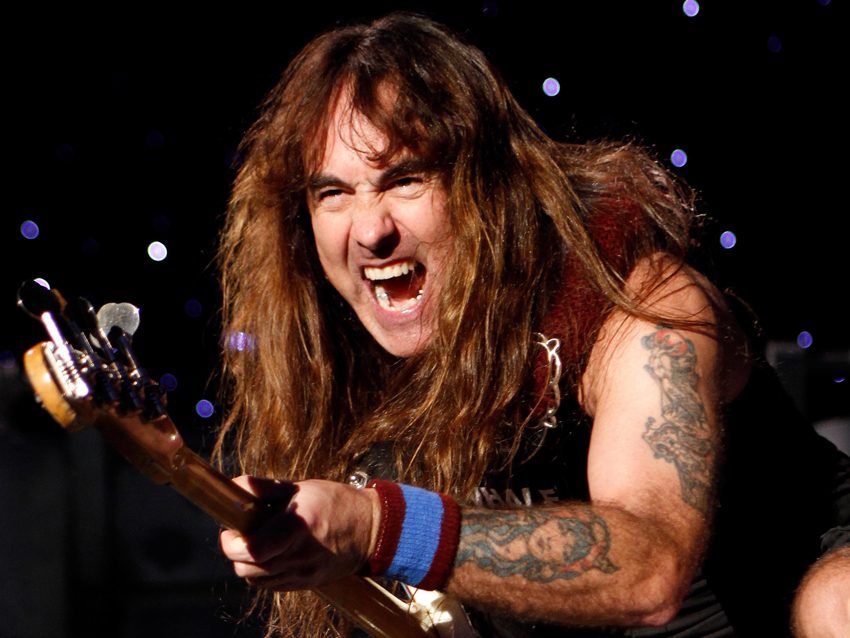
Iron Maiden's Steve Harris played the epic Where The Wild Wind Blows live, in sections, for Shirley and the band. © Scott D. Smith/Retna ./Retna Ltd./Corbis
What about Iron Maiden, however? Their new record, The Final Frontier, is very progressive and meticulously arranged. I have to imagine things were well plotted-out beforehand.
[laughs] "You'd think that, but Iron Maiden never do demos. Some of the songs were written in the studio and recorded in sections - with no click track, either, because they don't go in for that. In fact, Where The Wild Wind Blows was Steve playing and singing parts to us - we didn't know where he was going, but he did, and it came together in the end.
"Still, I have to say, I much prefer it when a band plays live in the studio instead of layering and doing things in sections. If you can get a great take of a song out of a band, it makes doing any overdubs and embellishments so much easier."
Several years back, you mixed Led Zeppelin's How The West Was Won. Tell me about your experience with Jimmy Page on that project.
"It was an amazing, humbling and incredibly gratifying experience. Jimmy had total faith in me. We sat down at first and listened to the tapes and made notes on the performances, stuff we liked, things we didn't. Obviously, if there was a performance or part that he didn't like, we wouldn't use it. He'd come into the studio while I was working, but he let me do what I felt was right. All in all, he was a total joy. He's Jimmy Page. He's Jimmy fucking Page!" [laughs]
The business has changed so much since you started out. What advice do you have for people who want to get into music production in this day and age?
"Well, I wouldn't say quit. There is work out there. But you have to be passionate about what you do. You have to believe in yourself and your convictions. You have to be realistic, however. Don't think about becoming a millionaire right off, 'cause it won't happen. The business is going to sort itself out. Music is too important to people and to culture. I think music and the chances to work in the business will stay around. So yeah…follow your heart as you follow the music."
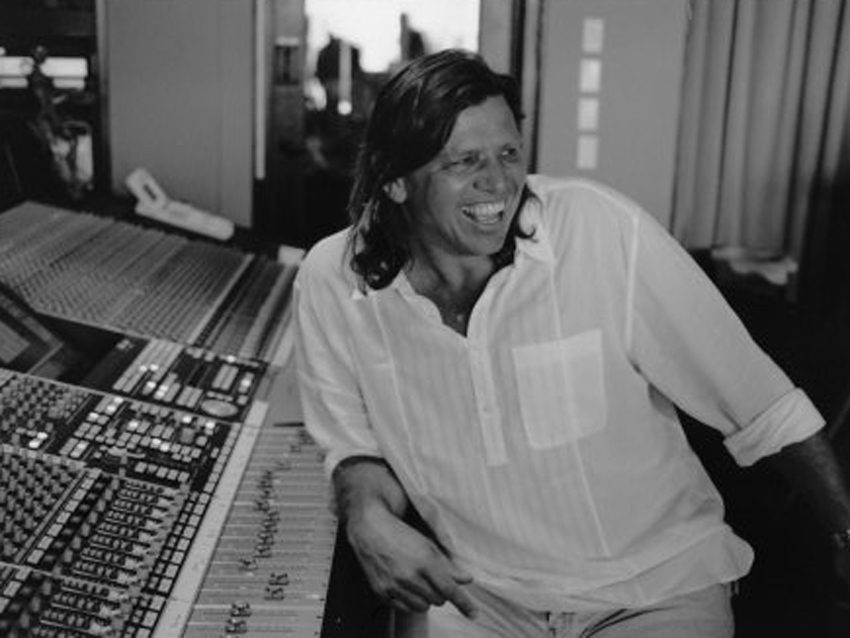
Making records can be fun! Shirley takes five during a session.
But because people can literally make records in their bedrooms on laptop computers, do you think it's still necessary to get a job in a studio and be a gofer?
"I don't think there's any one way to become a record producer. However you want to make records, it's all relevant. The most important thing is to understand how to interact with musicians. That's the biggest thing, really. If you can't get along with musicians and push them to make their best music, you won't go very far.
"That said, anybody can learn to make music in their bedroom, and there's nothing wrong with that - to a point. But being a studio, even if you have to make coffee for a year, you're learning important mechanics. You're part of something, part of the scene. You're learning how bands and musicians operate. You joke with them, bond with them, you're hearing their stories. You can't do that at home."
At the start of this interview, you stressed honesty as being one of the key traits to being a producer. How do you tell a musician that what he's doing isn't good?
"It's not always easy. You run into all kinds of situations where artists are doing things that don't sound good, and sometimes what they're doing is really bad. [laughs] But you can't say that. You can't say, Hey, that's bad' or 'Wow, that's terrible,' because that won't get you anywhere.
"There's a whole skill set you have to learn. Sometimes you're a schoolteacher; sometimes you're a friend; sometimes you're a policeman; sometimes you're a band member, and you're helping an artist to write a song; and other times, you even have to be a peacemaker and stop people from fighting. You have to learn a lot of psychology to work with artists, and the only way is just by doing it. It's an ongoing education, but it's one I find incredibly challenging and fascinating."
Joe is a freelance journalist who has, over the past few decades, interviewed hundreds of guitarists for Guitar World, Guitar Player, MusicRadar and Classic Rock. He is also a former editor of Guitar World, contributing writer for Guitar Aficionado and VP of A&R for Island Records. He’s an enthusiastic guitarist, but he’s nowhere near the likes of the people he interviews. Surprisingly, his skills are more suited to the drums. If you need a drummer for your Beatles tribute band, look him up.
